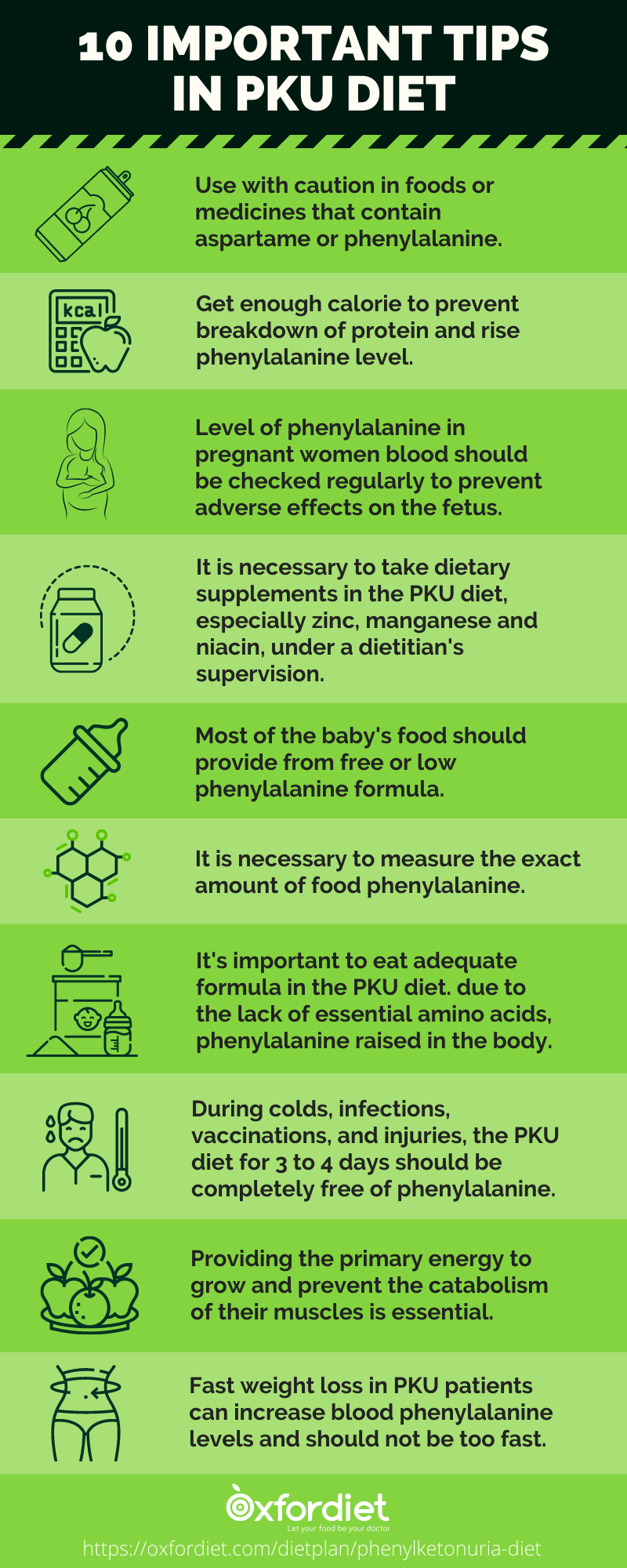Over 2,000 known genetic disorders in humans until now, genetic disorders in the body's metabolism were first introduced in 1908 by Mr. Garhoud. Clinical signs of a genetic disorder in metabolism usually begin in infancy. The only known treatment for most of them is diet.
If these patients are not treated, they will have several complications depending on the type of disease, and they can lead to mental retardation or physical retardation.
One of the most critical metabolic disorders is phenylketonuria (PKU), which occurs due to a lack of a specific body enzyme. The solution is a diet without phenylalanine that is considered in the phenylketonuria diet (PKU diet).
Phenylketonuria is a hereditary disease that is passed from parent to child. In PKU, due to a defect in the production of a specific enzyme in the liver, which is responsible for converting the amino acid phenylalanine to tyrosine, phenylalanine accumulates in the body and causes some problems.
When the phenylalanine level in the blood is abnormally high, it is converted to other compounds that are toxic to the body. These substances affect the central nervous system and disrupt the normal functioning of the brain.
Suppose PKU is not treated in time, and blood phenylalanine levels are not controlled with the PKU diet. In that case, it can lead to severe brain damage and mental retardation in the person.
As mentioned, the best way to control more metabolic genetic diseases is to have a good diet. Phenylketonuria is one of those diseases that can be controlled with a PKU diet and prevents further patient complications.
Phenylketonuria has no specific symptoms at the beginning of birth, and the patient is completely normal. Gradually, over time and the accumulation of phenylalanine in the body, symptoms such as lousy and specific urine and sweat odour, restlessness, vomiting, growth retardation, skin lesions and Finally, if not treated in time and used PKU diet, it causes mental retardation.
The PKU diet's primary goal is to reduce phenylalanine intake through the diet to maintain normal phenylalanine levels in the blood.
The acceptable phenylalanine level in the blood is varied and has a different range depending on each person's age. Phenylalanine should be tested regularly in the blood to make sure that it is in the normal range.
Therefore, based on each person's tolerance to phenylalanine, their PKU diet should be adjusted to control this amino acid intake and keep its level in the blood steady. Patients with phenylketonuria can not freely eat any food they want, and dietary restrictions should be imposed on the PKU diet. The most common limitation of the PKU diet is protein foods that rich in the amino acid phenylalanine. But since phenylalanine is an essential amino acid and its complete elimination from the PKU diet can cause developmental problems, we cannot entirely block receiving it. Therefore, it is necessary to have a good PKU diet that meets the body's phenylalanine requirement and prevents it from overdosing.
Dietary restrictions in the PKU diet usually last for the rest of your life, although after the age of 12, the severity of these restrictions decreases.
However, severe phenylalanine restrictions on the PKU diet should be continued in pregnant women.
Because it is critical to adjust the amount of phenylalanine in the PKU diet and its amount must be adjusted carefully and more or less phenylalanine in the diet causes many problems, be sure to consult a dietitian to adjust the PKU diet.
If you want to get the online PKU diet, click here.
♦ Use with caution in foods or medicines that contain aspartame or phenylalanine in your PKU diet. For example, each diet soda can contain approximately 105 mg of phenylalanine, which provides approximately 25 to 50% of a person's daily requirement. Therefore, when buying medicine or foods, be sure to pay attention to its label.
♦ Insufficient energy intake through the PKU diet or injuries caused by various diseases and infections and other damages leads to the breakdown of protein tissue in the body. It causes the release of phenylalanine in the blood. Under these conditions, the phenylalanine level of the PKU diet must be readjusted.
♦ A dietitian should thoroughly monitor the PKU diet in pregnant women, and the level of phenylalanine in their blood should be checked regularly. Raised phenylalanine levels in the blood of pregnant women can have adverse effects on the fetus, such as heart problems or mental damage, or microcephaly in the fetus.
♦ It is necessary to take dietary supplements in the PKU diet, especially zinc, manganese, and niacin, under a dietitian's supervision.
♦ Most of the baby's food should provide from free or low phenylalanine formula.
♦ Due to the importance of phenylalanine in the PKU diet, it is necessary to measure the exact amount of food consumed.
♦ Inadequate consumption of phenylalanine-free formula in children's diets can increase phenylalanine in their blood; due to the lack of other essential amino acids, protein production in the child's body is not done correctly, and unused phenylalanine accumulates in the body. So it's important to eat adequate formula in the PKU diet.
♦ During colds, infections, vaccinations, and injuries, the level of phenylalanine in the blood increases. At this time, the PKU diet for 3 to 4 days should be completely free of phenylalanine. Weight loss during illness should not exceed 5% of the patient's weight. Otherwise, it will increase the level of phenylalanine in the blood.
♦ Providing the primary energy to grow and prevent the catabolism of their muscles is essential. To increase energy intake in these patients, you can use jams, honey, oils, and other foods that do not contain phenylalanine.
♦ Fast weight loss in PKU patients can increase blood phenylalanine levels and should not be too fast. A standard weight loss diet can help these patients if they are overweight or obese.
